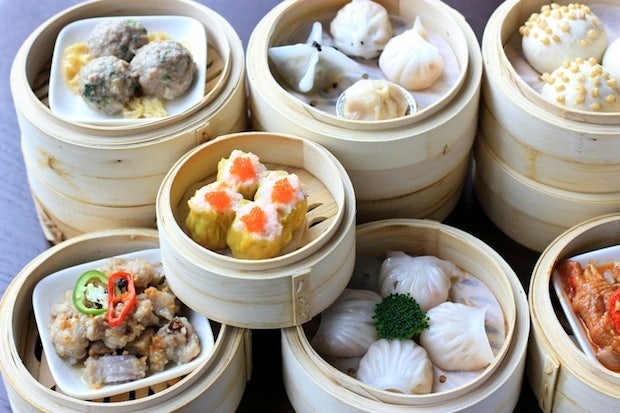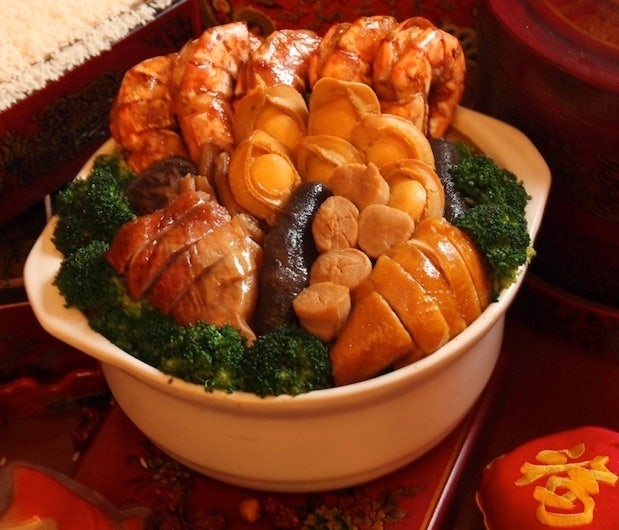
An ad for a Chinese New Year feast on Hilton Guangzhou's Sina Weibo page. (Sina Weibo/Hilton Guangzhou)
Among the industries hardest hit by the Chinese government's anti-corruption campaign—including high-end spirits, Swiss watches, and shark-fin soup—luxury hoteliers rank high thanks to depleted official spending on banquets. To try to counteract slumping profits during the Chinese New Year, many hotels are taking to Chinese social media to attract the consumer market to moderately priced holiday feasts.
As the government cracks down on officials’ extravagant, multi-course banquets stocked with expensive delicacies and top-shelf alcohol, China’s hotels have experienced an estimated 30 to 40 percent dining revenue decline the second half of 2013. In response, many hotels have adopted mass-market promotions of discounts, cheaper dining options, and the use of banquet spaces for events such as birthday parties and students’ post-graduation dinners for teachers.
As the anti-graft measures carry through into the Chinese New Year party season, many luxury hotels are continuing this strategy with Chinese New Year social media marketing of holiday buffet-style dinners aimed at upper-middle class families.
Several hotels are running online competitions appealing to fans’ sentimentality around the family-oriented holiday. Shangri-La and Hilton are asking Weibo users to send out a Weibo post listing their favorite Chinese New Year dishes for the chance to win prizes. Shangri-La’s campaign asks readers to tweet a message filling in the sentence, “I come from (blank) and the dish I can’t be without during my family reunion is (blank)” in order to be entered in a contest to win free dining vouchers for themselves and their family.

A Chinese New Year ad on Shangri-La's Sina Weibo page. (Sina Weibo/Shangri-La)
Westin is sponsoring a “Nutritious and Delicious” campaign, inviting users to write a post listing their favorite health food and forward it to three friends for the chance to win a Chinese New Year "SuperFoods" healthy meal. Meanwhile, Marriott asks its readers to write a post on their most-desired Chinese New Year “gift”, such as “avoiding parents’ persuasion to get married.” Those who transmit the message will be entered to win Marriott’s special Chinese New Year meal. In an effort to get diners through the door, the Beijing Four Seasons is offering a free Chinese New Year dessert to Sina Weibo fans and all of their guests.
Some hotels' social media marketing efforts are especially family-oriented. The Mandarin Oriental Hong Kong is offering a year of the horse contest in which users can win a special horse toy for their child if they list their favorite Mandarin Oriental amenity for children, which includes a special children’s menu. Ritz-Carlton Sanya is offering family New Year activities that will be enjoyable for "elders, parents, and children," including dumpling classes and tai chi.
Many hotels are using Chinese social media to promote the prices of their dinners, which are aimed solidly at the middle- or upper-middle class. Mandarin Oriental Guangzhou is promoting a Spring Festival meal that’s only RMB228 (US$37) per person, while St. Regis Beijing says on its account that it’s offering a buffet for RMB368 ($60) per person complete with ox tongue cakes, Beijing duck, lobster, fish, scallops, dumplings, and pastries. For consumers who can’t make it to a feast, The Peninsula is promoting its RMB158 ($26) cakes, a cheap alternative to the hotel’s gift baskets which range from RMB1,288 to 4,288 ($212 to $707). On the slightly higher end of the spectrum, W Guangzhou has taken to its Weibo to promote a 10-person table deal for Chinese New Year costing RMB498 ($83) per person—but even this price is likely less than the baijiu alone consumed per person at high-end banquets.
Even if hotels are able to attract a higher number of customers, the revenues certainly won’t be the same as lavish banquets in which bureaucrats dine on abalone and take shot after shot of several-hundred-dollar spirits. However, with the rise of China's middle class, this is often their best bet to maintain growth as long as the anti-graft campaign remains in high gear.
International hotel chains are also hoping to cash in on another group of wealthy Chinese—high-spending travelers. On its official Weibo page, the Four Seasons uploaded a photo of its Chinese New Year desserts at its Maldives location, a top vacation spot for Chinese tourists, while Mandarin Oriental is using Weibo to promote its Chinese New Year feast in global locations including Singapore, Kuala Lumpur, and Washington, DC. The Ritz-Carlton promoting its special Spring Festival dishes at its Los Angeles location, and offers the opportunity for visitors to write down wishes and hang them in red envelopes on a special Chinese New Year “wish” tree in the restaurant. With the restrictions placed by the government on official travel spending, these campaigns are aimed at the consumer market as well.
Jasmine Lu contributed to this report.